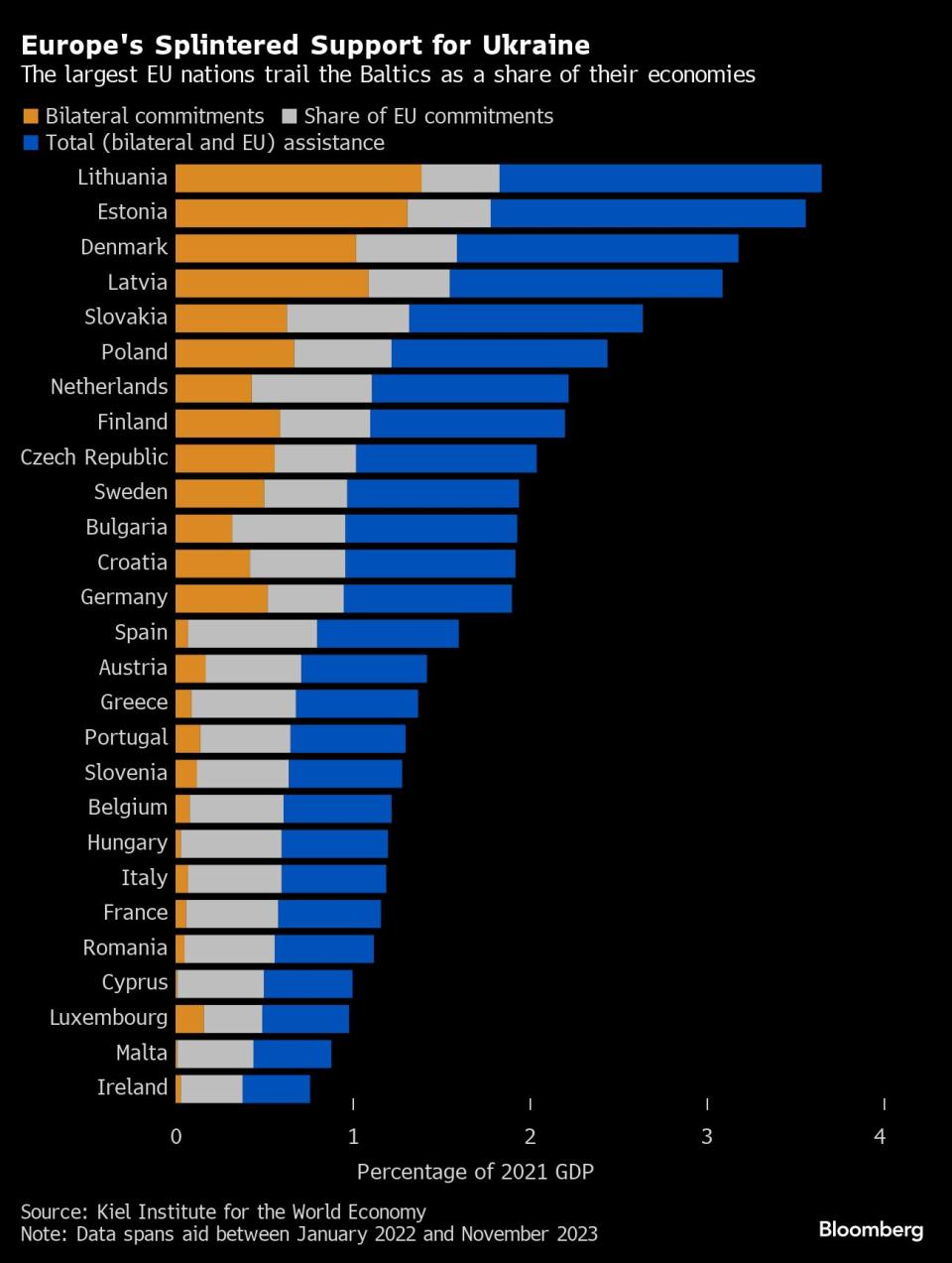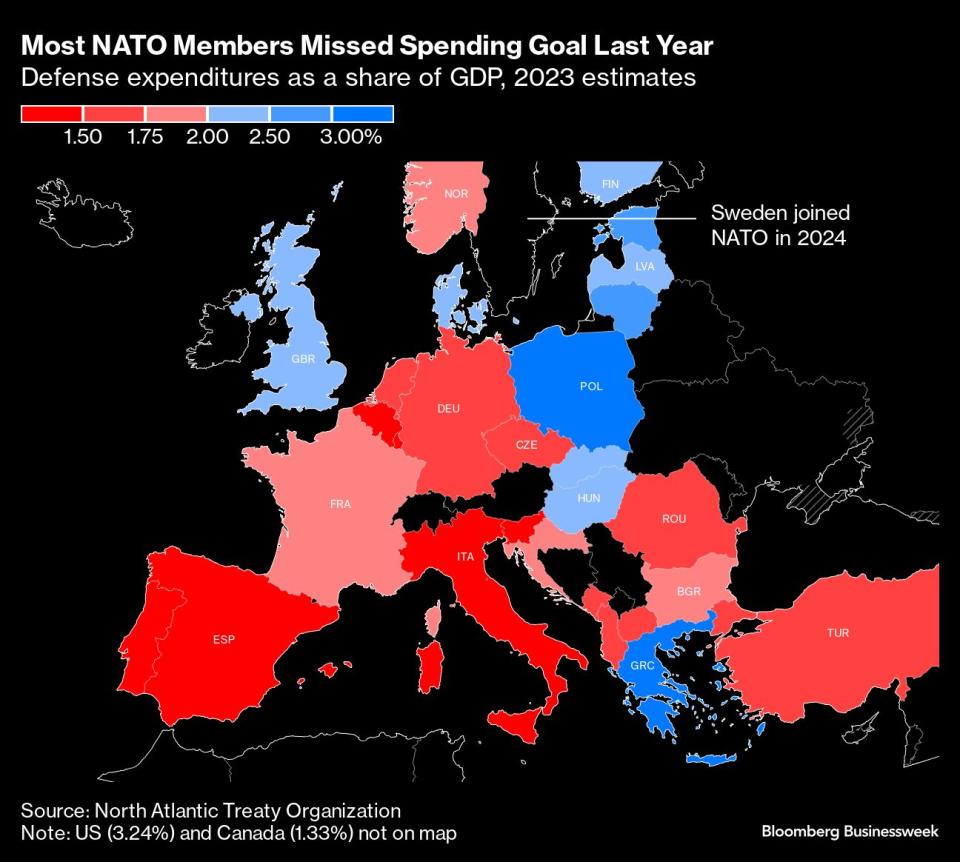NATO Proposes $100 Billion, Five-Year Fund to Aid Ukraine
- Oops!Something went wrong.Please try again later.
(Bloomberg) -- NATO Secretary General Jens Stoltenberg is proposing to establish a fund of allied contributions worth $100 billion over five years for Ukraine as part of a package for alliance leaders to sign off when they gather in Washington in July.
Most Read from Bloomberg
Apple Explores Home Robotics as Potential ‘Next Big Thing’ After Car Fizzles
Texas Toll Road Takeover to Cost Taxpayers at Least $1.7 Billion
A Million Simulations, One Verdict for US Economy: Debt Danger Ahead
Allies are still discussing Stoltenberg’s proposal and any mechanics of the accounting, including whether to factor in bilateral aid to Ukraine into the overall sum, according to people familiar with the discussions.
The proposal, which needs approval from the North Atlantic Treaty Organization’s 32 members, is likely to change before leaders agree, said the people, who spoke on the condition of anonymity.
“We need to shift the dynamics of our support,” Stoltenberg told reporters before NATO foreign ministers met Wednesday in Brussels. “We must ensure reliable and predictable security assistance to Ukraine for the long haul so that we rely less on voluntary contributions and more on NATO commitments, less on short term offers and more on multiyear pledges.” He declined to go into details on the fund.
“Ministers will discuss how NATO could assume more responsibility for coordinating military equipment and training Ukraine, anchoring this within a robust framework. We will also discuss a multiyear financial commitment to sustain our support,” Stoltenberg said. Moscow, he added, needs to understand that “they cannot wait us out.”
Spokespeople for the White House National Security Council didn’t immediately comment.
Read more: US Backs $50 Billion Ukraine Bond Using Frozen Russia Assets
As part of the package, NATO could also take over the operational duties of the US-led Ukraine Contact Defense Group, which coordinates weapons deliveries by about 50 countries to Ukraine, said the people. With NATO’s supreme allied commander, General Chris Cavoli, in charge, such a step could protect the structure from any political change that may result after the November elections.
The prospect of Donald Trump’s return has triggered increased talk among allies about what Europe should do to ensure the US is invested in transatlantic security. It’s also raised concerns among European officials that Trump could withdraw US aid to Ukraine in light of comments that he’d seek to end the war in a day.
If allies back Stoltenberg’s proposal, a move by NATO to take a more active role in aid for Ukraine would mark a paradigm shift for the military alliance, which has previously distanced itself from those efforts to avoid being potentially drawn into a wider war with Russia.
Yet, institutionalizing NATO’s support could signal their commitment to Ukraine for the long term, at a time when Russian President Vladimir Putin is betting he can outlast the Kyiv’s allies — especially as members are unlikely to extend a formal invitation to Ukraine to join the alliance when leaders gather in early July in Washington.
While having NATO lead discussions about aid to Ukraine might insulate it from US politics, it could subject the discussions to infighting between the alliance’s 32 members, including with Turkey and Hungary taking more nuanced stances in support for Ukraine.
NATO’s foreign ministers meet in Brussels on Wednesday and Thursday to celebrate the alliance’s 75th anniversary on April 4th. In addition to support for Ukraine, ministers are also likely to discuss who will succeed Stoltenberg when his term ends in October.
The US and other allies had hoped to wrap up the discussions in time for the ministers’ meeting and confirm Dutch Prime Minister Mark Rutte for the role. But Romania recently surprised allies by putting forward its own candidate, President Klaus Iohannis, meaning the decision is likely to be delayed, even as Rutte has won the backing of a large majority of the alliance.
Some eastern European countries had raised concerns about geographical representation within the alliance, with recent NATO chiefs hailing from either Nordic nations or the Netherlands. But even Baltic leaders are now throwing their weight behind Rutte.
Estonian Prime Minister Kaja Kallas on Tuesday said in a post on social media platform X that she backs Rutte for NATO’s secretary general. Lithuanian President Gitanas Nauseda said at a press conference in Vilnius that he too had endorsed the Dutch leader.
--With assistance from Courtney McBride, Jennifer Jacobs, Alberto Nardelli, Milda Seputyte, John Follain and Katharina Rosskopf.
(Updates with Stoltenberg remarks from fourth paragraph)
Most Read from Bloomberg Businessweek
©2024 Bloomberg L.P.





